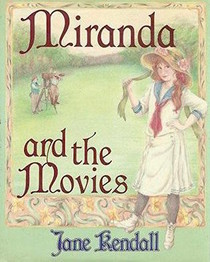For years I've been looking for a novel that takes place in the early age of film, and have been consistently disappointed. Either the film world is shoved into the background in preference of soap opera plots and famous name-dropping or the author utterly fails at capturing the era. Usually, the 1920s and 1930s get all the attention, with the very important 1910s ignored. Well, Jane Kendall finally gets it right and this book was a total treat for someone who knows the personalities of the era. The book is written with an eye to readers either being intelligent enough to recognize the names and business mentioned, or at least motivated to find out more, and I can assure you that reading about Biograph, Selig, Thanhouser, Vitagraph, the real American aka "Flying A", Kalem, Keystone, Pathe, and all the other early pioneers of film is not wasted time.
The cast of characters in the American Motion Picture Company are thinly disguised members of the real-life film world of the time, and there is some duplication as their actual counterparts are also referred to within the story. The cameraman Jerry Donnelly is obviously Billy Bitzer, and C.J. Tourneur is an immediately identifiable Cecil B. DeMille, with his at-a-distance passion for leading lady Dulcie a tip of the hat to D.W. Griffith's celluloid affair with Lillian Gish. Bobby Gilmer is inspired by Griffith stock player Bobby Harron in appearance and demeanor, if not exactly in backstory. (Harron had a less tragic childhood, but he did have a tragic end. I doubt, had Kendall ever finished the series, the same would have happened to Gilmer.)
This pilfering characterization may appear lazy, and it might have been so in the hands of a less skillful writer, but Kendall is anything but amateur. Her main protagonist, Miranda Gaines, has a realistic voice - she's bored, she's frustrated, and when the flicker folks move next door and stir up the entire town, the summer promises to be The. Best. Ever. Her infiltration of the movie troupe is done with humor and pathos that has a wholesome appeal that reflects what we think of the era at the time. Even so, she has her characters smoke and drink - unwelcome details in a boring and sanitized YA book world, but realistic of the time. As C.J. animatedly talks and dumps ciggy ash on his breakfast, you can't help but get a clear picture of the man and his drive to succeed in the picture business.
Miranda grows up during this summer of fun and sly deceit (she keeps her real-life and film worlds separate as much as she can), and discovers some secrets about her Aunt Lucy, whose strictness is more imposed by the town's society doyennes than her own inclinations. Probably Kendall's most serious moments - and integral to the plot - hinges on the issue of "The Trust," a nasty and violent piece of film history spear-headed by Thomas Edison that for awhile threatened the industry's independence. The American's frantic out-maneuverings of Edison's bully boys provides the story's suspense, and reinforces Miranda's dedication to changing her future by leaving her sleepy New Jersey town.
In the end, while I still hope to find a novel geared more for adults that deal with this era of film history, Kendall's book is a total gem of both history and storytelling.
The cast of characters in the American Motion Picture Company are thinly disguised members of the real-life film world of the time, and there is some duplication as their actual counterparts are also referred to within the story. The cameraman Jerry Donnelly is obviously Billy Bitzer, and C.J. Tourneur is an immediately identifiable Cecil B. DeMille, with his at-a-distance passion for leading lady Dulcie a tip of the hat to D.W. Griffith's celluloid affair with Lillian Gish. Bobby Gilmer is inspired by Griffith stock player Bobby Harron in appearance and demeanor, if not exactly in backstory. (Harron had a less tragic childhood, but he did have a tragic end. I doubt, had Kendall ever finished the series, the same would have happened to Gilmer.)
This pilfering characterization may appear lazy, and it might have been so in the hands of a less skillful writer, but Kendall is anything but amateur. Her main protagonist, Miranda Gaines, has a realistic voice - she's bored, she's frustrated, and when the flicker folks move next door and stir up the entire town, the summer promises to be The. Best. Ever. Her infiltration of the movie troupe is done with humor and pathos that has a wholesome appeal that reflects what we think of the era at the time. Even so, she has her characters smoke and drink - unwelcome details in a boring and sanitized YA book world, but realistic of the time. As C.J. animatedly talks and dumps ciggy ash on his breakfast, you can't help but get a clear picture of the man and his drive to succeed in the picture business.
Miranda grows up during this summer of fun and sly deceit (she keeps her real-life and film worlds separate as much as she can), and discovers some secrets about her Aunt Lucy, whose strictness is more imposed by the town's society doyennes than her own inclinations. Probably Kendall's most serious moments - and integral to the plot - hinges on the issue of "The Trust," a nasty and violent piece of film history spear-headed by Thomas Edison that for awhile threatened the industry's independence. The American's frantic out-maneuverings of Edison's bully boys provides the story's suspense, and reinforces Miranda's dedication to changing her future by leaving her sleepy New Jersey town.
In the end, while I still hope to find a novel geared more for adults that deal with this era of film history, Kendall's book is a total gem of both history and storytelling.




